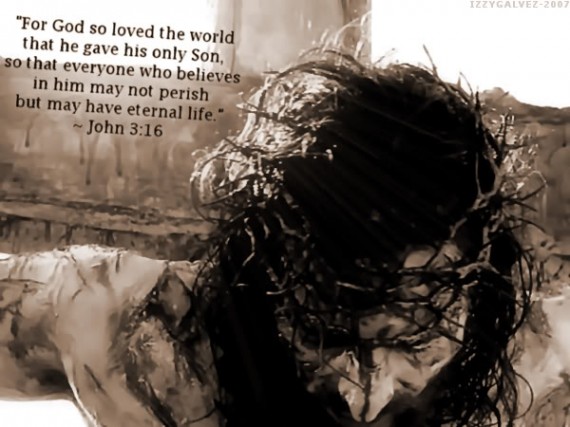A couple weeks ago, I announced that I was giving up on my proposal (…again).
Then Chuck McKnight alerted me to this video interview of Greg Boyd by Nate Cunningham.
The video should start at the 13:40 mark, but if it doesn’t, that is where the interview begins to talk about Greg Boyd’s proposal on how to understand the violence of God in the Old Testament.
Greg Boyd’s view sounds shockingly similar to the view I am having great difficultly defending from Scripture. I am not at all saying that Greg Boyd is borrowing from me (he doesn’t know me), but it makes me wonder if I was on the right track after all…
Sigh…
06/26/14 UPDATE:
As a follow-up from the comments below, here is a much more in-depth video about Greg Boyd’s proposal (thanks to Soli Deo Gloria):
It sounds shockingly similar to what I have been arguing. I promise I have never watched this video before until yesterday (June 25, 2014). The things he is talking about in this video I was writing about over a year ago. But it looks like he gave this Q&A several months before that… So did Greg Boyd steal my book, or did I steal his? Neither!
I was listening to a podcast this morning from 2012 where Raborn Johnson and Steve Sensenig talked about a Theology Rooted in Love, and they were saying many of the same things as well!
You know what I think is going on? This is another example where the Spirit of God moves in the hearts and minds of people all around the world to see similar truths at similar times so that we all work together to teach and learn what the Spirit is saying to the church. It is, as Richard Rohr calls it, the spiritual “symbiosis” between mutual members of the Body of Christ (Things Hidden, 2).
Anyway, watch the videos above, and then let me know what you think in the comments below.




 People often assume that we must determine whether or not God exists before we can raise the question of what this God is like.
People often assume that we must determine whether or not God exists before we can raise the question of what this God is like.
 When people seek to defend the idea that God is violent “because the Bible says so,” what they are really doing is allowing the violent portrayals of God in the Bible to override and trump the loving and merciful portrayals of God elsewhere in Scripture, even when both portrayals are talking about the same historical event.
When people seek to defend the idea that God is violent “because the Bible says so,” what they are really doing is allowing the violent portrayals of God in the Bible to override and trump the loving and merciful portrayals of God elsewhere in Scripture, even when both portrayals are talking about the same historical event. If a basic rule of hermeneutics is that the simpler and clearer texts should override the more difficult and troubling texts, and if Jesus Christ is the image of the invisible God so that He can say “if you have seen Me, you have seen the Father,” why do we choose to let the more troubling, difficult, and violent texts override and trump the loving, merciful, and Christlike texts?
If a basic rule of hermeneutics is that the simpler and clearer texts should override the more difficult and troubling texts, and if Jesus Christ is the image of the invisible God so that He can say “if you have seen Me, you have seen the Father,” why do we choose to let the more troubling, difficult, and violent texts override and trump the loving, merciful, and Christlike texts? How can a God who says "Love your enemies" (Matthew 5:44) be the same God who instructs His people in the Old Testament to kill their enemies?
How can a God who says "Love your enemies" (Matthew 5:44) be the same God who instructs His people in the Old Testament to kill their enemies?


 And yet, there is a deep truth here we must not miss. I ended the
And yet, there is a deep truth here we must not miss. I ended the  Though we may not always understand why and how sin and suffering enters into God’s world, one thing we can know through the crucifixion of Jesus is that God does not send sin and suffering, but rather, is a victim of it along with us.
Though we may not always understand why and how sin and suffering enters into God’s world, one thing we can know through the crucifixion of Jesus is that God does not send sin and suffering, but rather, is a victim of it along with us. 

 The first is what the writer of the book of Hebrews says about this event in Hebrews 11:28. In that text, the author clearly hesitates from saying that it was God who killed the firstborn sons of Egypt and writes instead about “he who destroyed the firstborn.” The author of Hebrews seems to be saying that it was the destroyer who destroyed the firstborn sons of Egypt, and it was God who kept the destroyer from touching the sons of those families who had the blood of the lamb on their doorpost.
The first is what the writer of the book of Hebrews says about this event in Hebrews 11:28. In that text, the author clearly hesitates from saying that it was God who killed the firstborn sons of Egypt and writes instead about “he who destroyed the firstborn.” The author of Hebrews seems to be saying that it was the destroyer who destroyed the firstborn sons of Egypt, and it was God who kept the destroyer from touching the sons of those families who had the blood of the lamb on their doorpost. Rather than kill the firstborn sons of His enemies, Jesus, the only begotten Son of God, lets Himself be killed by His enemies.
Rather than kill the firstborn sons of His enemies, Jesus, the only begotten Son of God, lets Himself be killed by His enemies.
